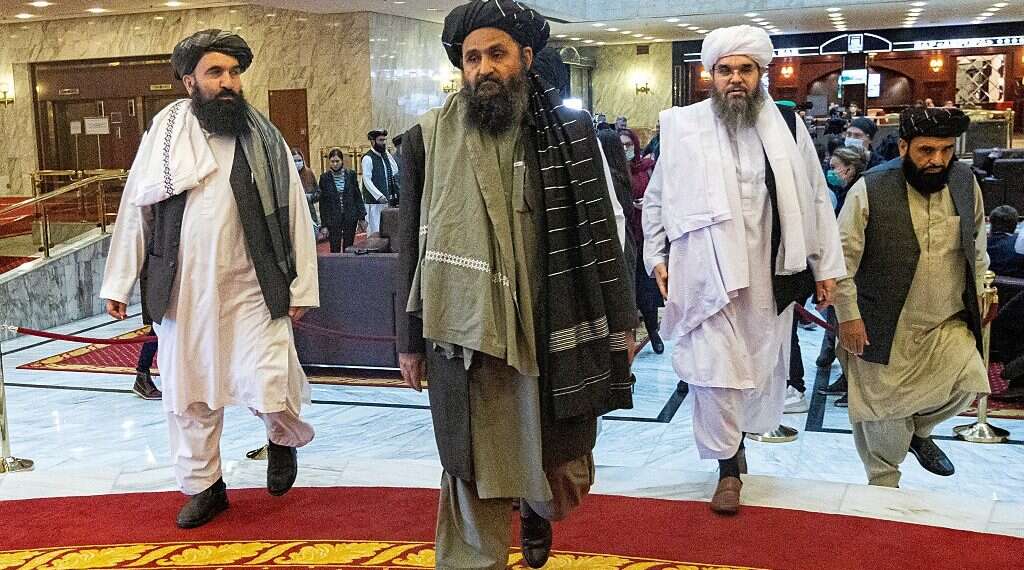by Ahmed Quraishi
Former foes are locked in difficult talks for a coalition government as pressure mounts on all parties to avert a renewed civil war.
 |
| Taliban co-founder and leader Mullah Abdul Ghani Baradar (center) | File photo: Reuters/Alexander Zemlianichenko |
Taliban leader Mullah Abdul Ghani Baradar has arrived in Kabul for talks with other Afghan leaders to discuss creating a new 'inclusive' government, an unnamed Taliban official told local news outlets Saturday, almost a week after the militants took over the capital.
The former foes are locked in difficult talks for a coalition government as pressure mounts on all parties to avert a renewed civil war.
The Taliban and the inner circle of former Afghan President Ashraf Ghani worked together – through an intricate web of connections and relationships on the ground – to avert a bigger war at the gates of Kabul last week.
Taliban leaders, former figures in the Ghani government, and former Northern Alliance commanders dispersed between Pakistan and Afghanistan have made progress in talks on forming a transitional government in Kabul. One source in contact with key Northern Alliance figures visiting the Pakistani capital of Islamabad even painted an optimistic picture of the backchannel talks that extended from Panjshir to Kabul, Islamabad, Doha, and Washington.
This comes with two parallel developments. Taliban commanders have resisted calls from hardline elements to declare a unilateral government by the Islamic Emirate of Afghanistan. At the same time, Ahmad Massoud, leader of the National Resistance Front of Afghanistan, met representatives of the Taliban in Panjshir, the seat of legendary former anti-Soviet warlord Ahmad Shah Massoud.
Massoud and most of the former Northern Alliance commanders and members of the previous government in Kabul have also refrained so far from declaring unilateral steps such as a government in exile, despite a flurry of contacts seeking legal opinion on such a move.
The talks are underway, largely far from the glare of the international media, which remains focused on the disturbing images from around the Kabul airport, and the heart-wrenching stories of journalists, women activists, and Afghans who worked with international forces – all of whom question the Taliban's narrative of moderation.
While in talks with the Taliban, Massoud has simultaneously called for the West to support his forces in Panjshir, an area in northern Afghanistan the Taliban has spared so far and is now the focus of anti-Taliban activities.
The Northern Alliance resisted the Taliban for much of the 1990s from Panjshir but failed to defeat the Taliban until the United States and NATO extended support after Sept. 11, 2001. The Alliance merged into successive Afghan governments after November 2001, and its commanders have been in power until Ghani fled the country last week.
Should the talks for a power-sharing deal collapse, there are serious doubts whether anti-Taliban forces in Panjshir or other former Northern Alliance commanders can hold back the Taliban. The same, however, is also true for the Taliban, which although powerful enough to control large swathes of Afghanistan may be unable to completely stamp out resistance.
Both the Northern Alliance and Taliban are mujahideen, representatives of an extremist version of Islam that has plagued Afghanistan for the past four decades and was instrumental in scuttling Western attempts at modernizing Afghan society. Many Afghan critics see both as two sides of the same coin. The Western-backed former Northern Alliance commanders were unsuccessful in translating unprecedented international support into enduring change in Afghanistan, mainly because they shared many of the regressive policies of the Taliban, especially in terms of women's rights, education, and government.
Before Sept. 11, the Northern Alliance was backed by Iran, India, and Russia, while the Taliban received backing from Pakistan, Persian Gulf states, and the US. The deck has been rearranged multiple times in the twenty years since 2001. Currently, the situation is murky at best. Most of Afghanistan's neighbors have little appetite for a reenactment of the proxy war of the 1990s.
A lot is at stake in the clandestine trilateral talks underway between former Northern Alliance commanders, Massoud's faction in Panjshir, and the Taliban. A group of Alliance commanders has been in the Pakistani capital since Aug. 15, and announced plans to extend its stay, raising hopes for a power-sharing agreement.
Ahmed Quraishi
Source: https://www.israelhayom.com/2021/08/22/taliban-chief-to-meet-with-afghan-leaders-to-form-inclusive-new-government/
No comments:
Post a Comment